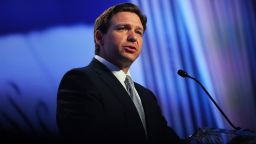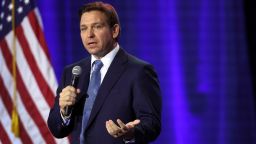Editor’s note: David Axelrod, a CNN senior political commentator and host of “The Axe Files,” was a senior adviser to former President Barack Obama and chief strategist for the 2008 and 2012 Obama presidential campaigns. The opinions expressed in this commentary are his own. View?more opinion?on CNN.
In the fall of 2007, a group of nervous donors summoned then-candidate Barack Obama to a meeting in Chicago and demanded changes in the leadership of his campaign in response to?lagging national poll numbers. Obama listened intently and politely.

Shortly after that meeting, Obama convened those of us who were running the campaign. He asked some pointed and justifiable questions as we entered the final stretch before the Iowa caucuses, the nation’s first nominating contest, on which we had made a win-or-go-home bet.
The amount of candidate time and resources we had spent collecting commitments from citizens in Iowa to caucus for Obama had come at the expense of national visibility and, panicked donors argued, national polling. But we believed from the start that a win over front-runner Hillary Clinton in Iowa was our best chance to upend the dynamics of the national race. In fact, we built our campaign on the premise.
By the time we met with Obama that fall, our numbers in Iowa, where we had built an army of organizers,?were beginning?to show progress. We outlined our strategic recommendations for the final months, got his input and sign-off, and proceeded on a path to victory.
While the doubts of anxious donors and prominent supporters — or “bedwetters,” as Obama campaign manager David Plouffe?indelicately called them?at the time — predictably found their way into anonymous quotes in The New York Times, the internal deliberations of the campaign did not. Nor did Obama shake up his team.
I thought about that history last week when Florida Gov. Ron DeSantis, now a Republican candidate for president,?replaced his campaign manager?after months of sliding polls. This move followed decisions to?significantly pare back?his payroll amid alarming warning signs about campaign spending and fundraising, and a promise to his own emergency meeting of nervous donors and key supporters to “reboot” his strategy.
But often it’s the product, not the packaging, that is the problem. And since DeSantis would, and could, not replace himself, he replaced part of the team around him.
It’s been a rocky road since those heady days last fall when DeSantis, fresh from a?landslide reelection victory?in Florida, emerged as the “Great Right Hope” for Republicans wary of another nomination for embattled former President Donald Trump.
DeSantis?soared in Republican primary polls?at the end of last year — even beating Trump in one poll — then hunkered down in Tallahassee for the winter to pursue a relentless?”war on woke” agenda?meant to thrill social conservatives and the MAGA base. Team DeSantis reasoned that when Trump collapsed under the weight of his legal woes, the governor would be there to scoop up the base. But a funny thing has happened on the way to the White House.
Trump has been?indicted three times?and faces a?possible fourth one?in Georgia. With each indictment, his Republican primary voters have remained firmly loyal to him — embracing his defiant claim that the prosecutions were politically motivated exercises in “election interference.” Simply put, these voters are not searching for a new and improved version of Trump. They’re inclined to stick with The Original. (Trump denies wrongdoing in all three indictments.)
DeSantis, who?officially announced?his candidacy in May, has seen his numbers steadily sink in the national polls as Trump’s have risen. The governor still clings to second place nationally but today trails Trump by a staggering 37 points, according to a?recent New York Times/Siena College poll.?The?polling gap?between them in the first state contest, Iowa, where DeSantis is hoping to follow Obama’s upset strategy and change the trajectory of the race is a less daunting but still formidable 24%.
Sometimes overhauls can work for presidential campaigns. Republican John McCain, who had slipped from front-runner to a money-starved, back-of-the-pack contender in the summer 2007,?laid off staff, shook up his leadership team and, a year later, won the Republican nomination. John Kerry made changes when?he was flailing?in the fall of 2003 and ended up winning Iowa, New Hampshire and the Democratic nomination in 2004.
But that may not be the case for DeSantis.
He has proven himself to be an awkward campaigner, more comfortable lecturing on the perils of “wokeism” from a platform than?mingling and mixing with prospective voters. He has?stumbled in interviews, and often parses his answers in nakedly political ways — especially when asked about Trump.
This has set up a contrast among Republican voters, who view DeSantis as an ambitious, conventional politician versus Trump, the audaciously authentic and potent avatar of an anti-establishment populist movement. The contrast was especially clear last weekend at the Iowa State Fair, where Trump?received rock-star treatment?— and DeSantis, by and large, did not.
DeSantis’ flaws as a campaigner are problems that cannot easily be fixed, in part because the candidate may be resistant to their fixing.
Abraham Lincoln is?alleged to have once said, “A man who represents himself has a fool for a client.” The same can be said of a candidate for president who runs his own campaign. One of the concerns that has long bounced around Florida political circles is?DeSantis’ overreliance?on his own political instincts and those of his wife, Casey DeSantis, a former television news anchor.
Maybe DeSantis has been chastened by the humbling opening stanzas of his campaign. But it’s not clear how much of a shake-up last week’s change really represented as DeSantis?moved?his manager — a longtime political aide — to the position of chief strategist and summoned his chief of staff from Tallahassee to become the new manager.
Still, while this midsummer drama is a sign of distress, it’s too early to count DeSantis out.?Iowa has traditionally broken late and often in unexpected directions. Trump?lost?the state in 2016 to Sen. Ted Cruz of Texas, who, as DeSantis is today, played to the social conservatives and evangelical voters who dominate the Republican caucuses.
Get Our Free Weekly Newsletter
- Sign up for CNN Opinion’s newsletter
- Join us on Twitter and Facebook
Indisputably bright and energetic, DeSantis has strong support within Iowa’s elected Republican establishment,?including warm relations?with the state’s popular governor, Kim Reynolds, who?has not ruled out?the possibility of a late endorsement. He?is spending much of his campaign time in the state and should, with recent adjustments and the help of a well-funded super PAC, have the resources to make a strong final run.
Next week’s Republican presidential primary debate also offers DeSantis a chance to reset the narrative and stay a step ahead of others seeking to become the alternative to Trump.
As with everything in presidential politics today, so much relies on Trump’s trials. Will his support begin to fray amid growing concerns about what his nomination would mean in a race against President Joe Biden? Or will the base dig in and his grip hold?
There are reasons to doubt whether DeSantis can live up to his extravagant advance billing. But he, like Obama, is placing all his chips on Iowa.




